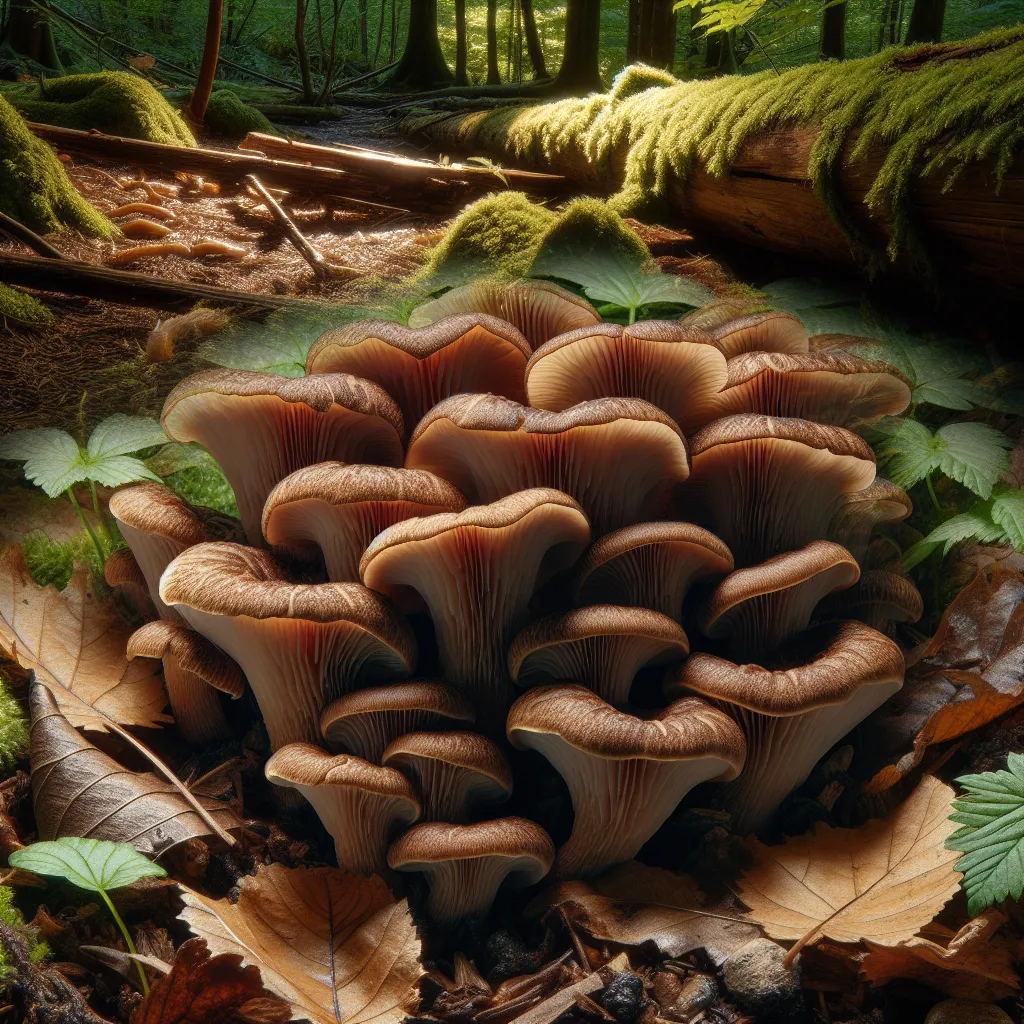Maitake mushrooms (Grifola frondosa) are not only a culinary delight but also a treasure trove of health benefits. With an earthy aroma and a hearty taste, these mushrooms have been increasingly recognized for their nutritional value and therapeutic potential. In this article, we’ll delve into the profound health benefits, nutritional content, and versatile uses of the maitake mushroom.
The Majestic Maitake
The maitake mushroom has a rich history and an array of nicknames that reflect its esteemed place in nature and cuisine. Known commonly in the U.S. as the “hen-of-the-woods” for its resemblance to a fluffed-up hen, its also commonly called “sheep head,” and even the regal “king of mushrooms,” maitake also means “dancing mushroom” in Japanese. This name is believed to have been inspired by the joy people felt upon finding these valuable mushrooms in the wild.
Maitake mushrooms grow in a unique circular cluster of wavy caps, often found at the base of hardwood trees, particularly oaks. They can grow impressively large, with some reaching up to three feet in diameter and weighing as much as 50 pounds. Their typical appearance includes gray-brown caps with white-cream undersides that house one to three pores per millimeter, a characteristic of the polypore group of mushrooms to which they belong.

A Nutritional Powerhouse
Maitake mushrooms are celebrated for their high nutritional value. They are a rich source of vitamin D, which is crucial for bone health and calcium absorption. The vitamin D content in maitakes can be particularly high when they are wild-harvested and exposed to sunlight, averaging about 1123 IU per serving, which is over 200 percent of the daily recommended intake.
Furthermore, maitakes offer a good dose of beta glucan, niacin, riboflavin, phosphorus, and potassium. A ½-cup serving of fresh maitake mushroom contains:
- Calories: 11
- Protein: 1 gram
- Fat: 0 gram
- Carbohydrates: 2 grams
- Fiber: 1 gram
- Sugar: 1 gram
The presence of beta glucan in maitake is of particular interest due to its potential health benefits, which we will explore next.
Health Benefits of Maitake Mushrooms
Heart Health
Maitake mushrooms contain beta glucan, a polysaccharide that has been shown to help reduce cholesterol levels and improve artery functionality, which can contribute to better cardiovascular health and lower the risk of heart disease. Research has found that maitake polysaccharides can reduce LDL (bad) cholesterol without negatively impacting triglyceride or HDL (good) cholesterol levels.
Immune System Support
The beta glucan in maitake is also known to bolster the immune system. Specifically, the D-fraction of maitake enhances the production of lymphokines and interleukins, which are crucial for an effective immune response. These properties make maitake a valuable ally in maintaining overall health and combating illness.
Cancer Support
Remarkably, maitake mushrooms have shown promise in supporting cancer treatments. Beta glucan has been observed to target and destroy cancer cells, with several studies highlighting its ability to combat tumors in various types of cancer. Moreover, the combination of D-fraction and MD-fraction with vitamin C has demonstrated enhanced effects in cancer therapies.
Diabetes Management
For those managing diabetes, the SX-fraction of beta glucan in maitake has been clinically shown to lower blood glucose levels. This compound aids in activating insulin receptors and reducing insulin resistance, which is a significant factor in diabetes management.

How to Use Maitake Mushrooms
Maitake mushrooms offer culinary versatility along with their health benefits. They can be used much like any other mushroom, adding a robust flavor and texture to a variety of dishes. Here are some creative ways to incorporate maitake mushrooms into your meals:
- Craft a rich maitake mushroom Alfredo pasta.
- Prepare an Asian-inspired hot pot featuring maitake, soba noodles, cabbage, tofu, onions, and carrots.
- Enhance a wild rice dish with cooked maitake mushrooms.
- Create a savory stuffed chicken breast with prosciutto and maitake, baked to perfection.
When purchasing maitake mushrooms, look for fresh specimens without signs of rot or bad odors. It’s best to rinse them right before use to maintain their freshness.
What to Watch Out For
As beneficial as maitakes can be, it’s important to consider their impact on blood sugar levels, especially if you are undergoing diabetes treatment. Consulting with a healthcare provider before adding maitake to your diet is advisable to ensure it aligns with your health plan.
Supporting Resources
For those interested in exploring the scientific research behind maitake’s health benefits, here are a few resources to consider:
- A study on the antitumor activities of maitake published in Oncotarget.
- The International Journal of General Medicine provides insight into the synergistic effects of maitake D-fraction with vitamin C for cancer therapy.
- Detailed information on beta glucans and their impact on cholesterol can be found in the International Journal of Molecular Medicine.
In conclusion, maitake mushrooms are not just a delicacy but also a source of significant health benefits. From supporting heart health and the immune system to assisting in cancer treatment and diabetes management, these mushrooms are a valuable addition to a health-conscious diet. Whether for their nutritional value or their unique taste and texture, maitake mushrooms are truly a gift from nature worth exploring.
